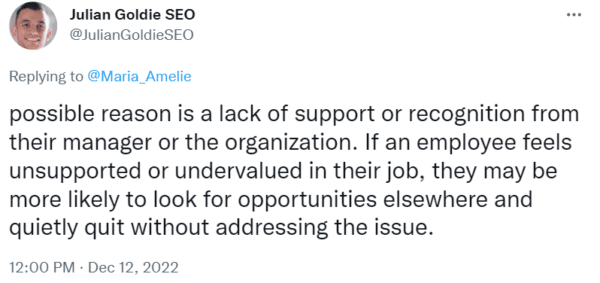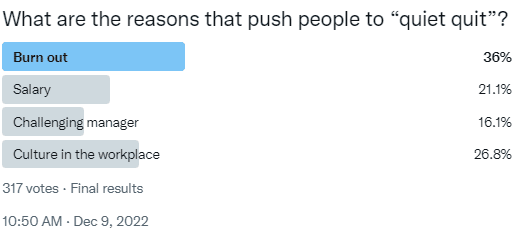“I’m just gonna come in and do my job. Still doing all my deliverables, but not a day early, not doing anyone else’s job on top of mine, not coming in a minute before 9 a.m. and not staying a minute later than 5 p.m. I don’t care anymore.”
This is quiet quitting.

40% of the global workforce is looking to leave their jobs in the next 3 to 6 months, according to “To quit or not to quit” by Mckinsey and Company. The difference will be in how they will choose to leave, which will also have significant effects on businesses.
While the term “quiet quitting” has been trending recently, there is a misunderstanding that must be addressed regarding the concept.
Setting boundaries, such as declining to work excessive hours, weekends, or being on call for non-urgent requests outside of regular business hours, is not a form of quiet quitting. Rather, it is a matter of self-respect and taking care of one’s own well-being.
True quiet quitting occurs when an employee, unhappy with a situation at work and unable to find a satisfactory resolution, chooses to depart without causing a fuss.
This is not an act of cowardice, but a decision made in the interest of preserving one’s own peace of mind.

It is a common occurrence that when an employee is quietly quitting, they will focus solely on meeting the minimum requirements of their job, and no more. This is often done for fear of being terminated before securing a new position.
However, the employee will likely go to great lengths to conceal their job search and intent to leave, and their behavior and demeanor at work will not change. None will notice a thing.
It is only when they formally tender their resignation or depart that the full extent of their quiet quitting becomes apparent.
The costs of quiet quitting
An employee who has decided to quietly leave will only stay in a job until the role looks decent in their CV (one year tops if they are new) or only a few months more until they secure the next job.

Other costs associated with quiet quitting are:
Lost productivity
When an employee quits, the company may have to scramble to find a replacement, which can lead to lost productivity as the new hire gets up to speed.
Increased workload
In the meantime, remaining employees may have to take on additional responsibilities to cover the workload of the departed employee, leading to increased stress and burnout.
Training costs
The company may have to invest time and resources into training a new employee to replace the one who quit, which can be costly.
Negative impact on morale
Quiet quitting can also have a negative impact on morale among remaining employees, as it may create a sense of uncertainty and insecurity about the stability of the company.
Reputation damage
If quiet quitting becomes a common occurrence at a company, it may damage its reputation and make it difficult to attract top talent in the future.
Especially if the reason a valuable employee quietly leaves is a manager, once that employee leaves, he or she will start talking among those very close to them.
Let’s not forget the financial costs of recruitment and new equipment, too.
The root cause
Poor management is frequently the root cause of quiet quitting. In particular, a lack of effective communication and excessive micromanagement can contribute to this phenomenon.

When an employee’s attempts at communication with their manager are met with confrontation, misunderstanding or friction, they may feel disheartened and choose to silently depart rather than risk further conflict.
Similarly, a manager who constantly checks on the work of their employees, scrutinizes every detail and micromanages every aspect of their work is likely to drive even the most talented and dedicated staff to consider quietly quitting.
Such behavior fosters a toxic and oppressive work environment that ultimately proves unsustainable for those who value their own well-being and professional satisfaction.

At some point in our lives, we all have quietly quit a job, other reasons include:
Fear of retribution
Some employees may be afraid to speak up or voice their concerns to their manager for fear of retribution or negative consequences.
Lack of trust
Some might feel that their concerns will not be taken seriously, leading them to quit quietly rather than trying to address the issue through communication.
Feeling overwhelmed
Some employees may feel overwhelmed or stressed and may not know how to effectively communicate their concerns to their manager. They may therefore choose to quit quietly rather than to navigate a potentially difficult conversation.
Lack of confidence
Some employees may lack the confidence to speak up or communicate their concerns to their manager, leading them to quit instead quietly.
There’s also fear of damaging relationships in the workplace.
Quiet quitting in SEO: 4 common reasons
In a recent Twitter poll, I asked SEOs what they think is the most important reason to push people to “quiet quit” and these were the results:

Burnout
In the fast-paced and high-stress world of agency work, burnout is all too common.
The constant pressure to be alert and responsive, the feeling of being chased by an ever-present deadline, and the constant demand to deliver can take a toll on one's mental health.

It is a sad reality that burnout is often glamorized in some SEO agencies, particularly those that prioritize acquiring new clients and taking on unrealistic deliverables instead of investing in their teams and considering their capacity.
The result is an environment where new challenges are thrown at already overburdened teams, expected to be delivered, as vulgarly said, “by yesterday.”
The SEO sweatshop: The quiet quitting central
Characterized by large open offices where employees are expected to be onsite from 8 a.m. to 7 p.m., five days a week, with no hybrid or remote work options, these places churn out jargon-laden SEO reports with no value at all, unhelpful content, “land” useless links on the media but all done at a rapid pace, sticking up to the philosophy of done “by yesterday.”
In the SEO sweatshop, the "perks" offered to employees are often little more than sweets, trinkets, and fast food, and the culture is one of unhealthy imbalanced lifestyles.
In such agencies, burnout, quiet quitting, and high staff turnover are all too common, as employees are subjected to long hours, low salaries, and immature, uneducated managers who prioritize profits over the well-being of their teams.

Signs of burnout include:
- Feelings of physical, emotional, and mental exhaustion: The employee may feel drained and unable to keep up with their usual workload.
- Decreased productivity and quality of work: Burnout can also lead to a decrease in productivity, as the person may struggle to focus, make decisions, or complete tasks.
- Negative attitudes: Burnout can lead to negative attitudes, such as cynicism, detachment, or frustration. The person may be more critical of their work or colleagues or be the passive-aggressive SEO starting dramas on Twitter.
- Increased absenteeism: Burnout can also lead to increased absenteeism, as the individual may take more time off or call in sick more often.
At the same time, managers should keep a close eye on the following employee traits that lead to burnout:
- Eating lunch at their desk.
- Staying late.
- Timesheets showing over nine hours done a day.
- Sending and responding to emails over the weekend (which also creates a toxic work environment.)
The most significant issue with the SEO sweatshop model is that it is a problem that is evident to everyone in the company, with the exception of the manager.
In these places, there is a culture of disregard for the well-being and professional satisfaction of employees, leading to a cycle of burnout and turnover that ultimately harms the company as a whole.

Culture in the workplace
When the culture within a company is toxic or negative, employees may feel that they have no other option but to leave.

This can be particularly true in cases where the culture is characterized by excessive micromanagement, harassment, discrimination, and poor career progression.
When employees do not feel safe or supported in their work environment, they may opt to resign quietly rather than confront the issue or raise a complaint.
Additionally, if the culture of the company does not align with an employee's values or goals, they may choose to depart in favor of a more harmonious and fulfilling work environment that aligns with their personal beliefs and aspirations.
Challenging manager
A challenging manager is someone who does not provide clear direction or support to their team, making it difficult for employees to do their job effectively. This can lead to feelings of frustration and insecurity and may cause employees to question their ability to succeed in their roles.
When an employee feels like their manager is not supportive of their career development or growth, they may choose to leave the company in search of a more supportive and nurturing work environment. This can be especially true if the employee has a long-term career goal in mind and feels like their current manager is not helping them to achieve it.
Salary
In a company where workload and responsibilities increase over time but salaries do not, it is not uncommon for employees to turn to quiet quitting as a means of seeking better opportunities elsewhere.
When career progression is hindered by a lack of pay increases and employees feel undervalued and unappreciated.
The post-COVID-19 landscape has further exacerbated this trend, as employees increasingly prioritize their well-being and seek work environments that align with their values and goals.
To prevent costly and damaging instances of quiet quitting, it is essential for managers to clearly communicate policies on pay and career progression from the outset.
By doing so, they can avoid losing valuable employees and ensure that the talent they have invested in is able to thrive and grow within the company.
Prioritizing well-being in SEO
When speaking up, it is important for a manager and an employee to be factual and avoid reacting at all costs.

To prioritize well-being in your SEO team, consider the following.
- Set clear expectations: Have structure as well as processes in place. There is nothing more unsettling than a manager that expects a new employee to immediately know how to do the job without the appropriate onboarding.
- Encourage work-life balance: Encourage employees to take breaks, use their vacation time, and disconnect from work outside office hours.
- Promote a positive work culture: Create an environment that is supportive, collaborative, and respectful. Encourage open communication and feedback. Positive culture is not equal to forced fun.
- Monitor workload carefully and do not micromanage: Make sure that employees are not taking on too much work and that they have the support they need to manage their workload effectively.
- Provide opportunities for growth and development: Offer training, mentorship, and other opportunities for employees to learn new skills and advance their careers.
Remember, it is all about taking notes, listening and following up by email with a plan.
Additionally, offering support resources such as counseling and health and wellness programs can help employees to manage stress and prevent burnout.
By prioritizing the needs and well-being of your team, you can create a work environment that is conducive to success and retention.

The post Understanding quiet quitting in SEO – the silent exodus appeared first on Search Engine Land.
No comments:
Post a Comment